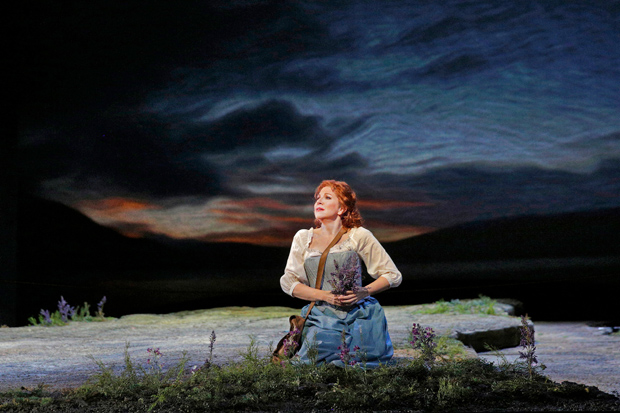La Donna del Lago, based on a poem by Sir Walter Scott, is one of the nine serious, dramatic operas that Rossini wrote for Teatro San Carlo in Naples between 1815 and 1822. At the time the opera was produced he had at his disposal not only a great soprano, for whom he wrote with considerable flair, but two expert tenors and a contralto taking the part of the young male lover. In the first-ever production at the Met in New York that has just opened, the colours move from the sultry sky of Scotland in the first act to the starkness of a field after battle and then the sumptuous golds in King James V’s palace in the second act. Something like this happens too in the vocal writing, which ranges from the stunningly beautiful to tones that are darker and more restrained.
The heroine, Elena, is sung by Joyce DiDonato, whose voice here has extraordinary range and displays the most subtle attention to colour and detail. In the first act, she meets the King (Juan Diego Florez) who is in disguise. At war with Elena’s father, he becomes smitten by her during this encounter; the problem is that Elena’s father has promised her to one of his supporters, and there is also another suitor, Malcolm, with whom she is really in love.
Juan Diego Florez, one of the most handsome men in the world, is made for longing. His voice is filled with boyish and melancholy desire; the plaintive zeal with which he sings the high register evokes the most exquisite kind of need tinged with a sense of how sad loss will make him. The scenes between him and DiDonato are pure show-stoppers, even when some of the music is close to formulaic and banal.
DiDonato has a way of attending to each nuance of the score and also the drama itself — her plight as the one who is desired — which makes you listen to her singing with fierce attention and delight. That this happens both in the great arias and in the duller sequences is a tribute to her command.

Enter Malcolm, with whom Elena is actually in love. He is played to shocking, stunning effect by the Italian mezzo Daniela Barcellona who has been made to look like a wild Scotsman. (‘Malcolm is the big girl,’ one lady at the interval explained to another lady.) Her voice makes clear that, although there are some magnificent choral pieces in the opera, it is not a work made for ensemble singers, but for stars. DiDonato, Florez and Barcellona take the parts written for them and make them personal, as though the opera were created precisely for their particular vocal talents and ranges of expression. The moments when Barcellona, who has a very powerful voice, lets go, while singing towards the audience, make you forget that she is meant to be playing a man and allow you to relish the mixture of passion and control.
While some of the early choral writing, especially for the soldiers on their way to battle, must have been written in Rossini’s sleep, there are other choral sequences, especially at the palace, which are inspiring and memorable. There are times when the orchestra has little to do. With Michele Mariotti as conductor, it doesn’t try harder than it should. This means that, when there are genuine surges and flourishes, the orchestra can rise to match them.
The lighting and costumes, the setting and the choreography, especially for the outdoors scenes, have a solidity and drama that makes them look like a painting by Géricault. But what matters to the composer, it seems, is the singing. More than the drama, or the story, or the setting, Rossini wrote so that three or four great singers could display their talent. In casting DiDonato, Florez and Barcellona, the Met has managed to resurrect this opera and do justice to these great parts.






Comments